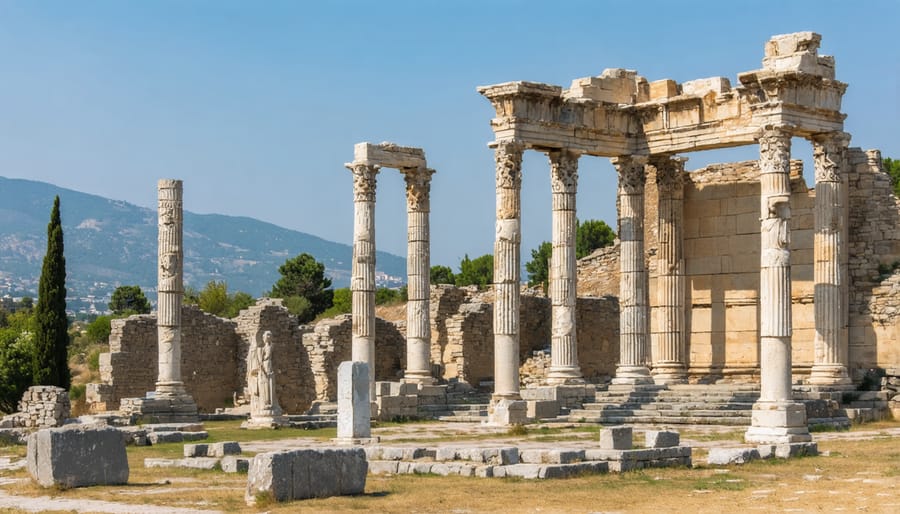Journey through time as we explore one of Christianity’s most fascinating intersections of prophecy and history – the seven churches of Revelation. These ancient congregations, addressed in John’s apocalyptic vision, serve as both historical landmarks and timeless mirrors reflecting the challenges, triumphs, and spiritual conditions churches face throughout the ages. By understanding Revelation‘s messages to Ephesus, Smyrna, Pergamum, Thyatira, Sardis, Philadelphia, and Laodicea, we gain profound insights into God’s expectations for His church and vital lessons for our faith communities today.
From the loveless orthodoxy of Ephesus to the lukewarm wealth of Laodicea, each church received a divine assessment that transcends its historical context. These messages continue to resonate with striking relevance, offering both warnings and encouragement to modern believers. As we examine these seven churches, we’ll discover how their strengths, struggles, and spiritual conditions parallel our own experiences, providing a divine blueprint for evaluating and strengthening our faith communities in the 21st century.
Whether you’re a church leader seeking wisdom for your congregation, a student of biblical history, or a believer wanting to deepen your faith, this exploration of the seven churches reveals timeless principles for spiritual vitality and faithful witness in an ever-changing world.
The Historical Setting of the Seven Churches
In the late first century AD, when the Book of Revelation was written, Asia Minor (modern-day Turkey) was a thriving center of Roman influence and Christian growth. Recent archaeological discoveries in Asia Minor have helped us better understand the vibrant world these seven churches inhabited.
The region was highly urbanized, with well-established trade routes connecting major cities. Each of the seven churches existed within distinct cultural and economic contexts, facing unique challenges to their faith. Ephesus was a major port city and commercial hub, home to the Temple of Artemis. Smyrna (modern-day İzmir) was a wealthy trade center known for its loyalty to Rome. Pergamum housed a significant imperial cult and was famous for its library, second only to Alexandria’s.
These cities were interconnected by the Roman postal route, which explains the order in which the churches are addressed in Revelation. The cultural landscape was diverse, with Greek philosophy, Roman governance, and various pagan religions all competing for influence. Christians often faced pressure to participate in emperor worship and local pagan festivals, which created significant tension for believers trying to maintain their faith.
The letters to these churches reflect real communities dealing with actual challenges. Some struggled with false teaching, others with persecution, and still others with spiritual complacency brought on by material prosperity. Despite their geographical proximity, each church faced distinct spiritual and social pressures that shaped their character and challenges.
Understanding this historical context helps us appreciate the relevance of Jesus’s messages to each church. Their situations mirror many of the challenges modern churches face: maintaining doctrinal purity, resisting cultural pressure, avoiding spiritual lukewarmness, and remaining faithful during persecution.
Just as these ancient communities stood as beacons of faith in their time, their stories continue to inspire and guide believers today, reminding us that God’s truth remains constant even as cultures change.


Messages to the Seven Churches

Ephesus: The Loveless Church
The church at Ephesus, while commended for its doctrinal purity and perseverance, received a sobering rebuke from Jesus: they had forsaken their first love. Despite their admirable qualities – hard work, patience, and discernment against false teachers – something vital was missing. Their service had become mechanical, lacking the passionate devotion that once characterized their relationship with Christ.
This spiritual condition mirrors a common challenge in modern church life. Like the Ephesians, we can become so focused on doing things right that we forget about our love relationship with Jesus. Their story serves as a powerful reminder that correct doctrine and diligent service, while important, cannot replace genuine, heartfelt love for Christ.
Jesus’ remedy was threefold: remember, repent, and return to their first works. This prescription still applies today. We’re called to remember our initial joy in Christ, repent of our cooling love, and renew our devotion through intentional actions motivated by love rather than duty.
The warning to the Ephesian church echoes through time: without love at its core, even the most active and doctrinally sound church risks losing its spiritual vitality and purpose.
Smyrna: The Persecuted Church
The church in Smyrna faced intense persecution, yet Jesus had no words of rebuke for this faithful congregation. Instead, He acknowledged their suffering and poverty, declaring them spiritually rich despite their material hardship. Located in modern-day Izmir, Turkey, Smyrna’s Christians endured severe opposition from both Jewish and Roman authorities, culminating in the martyrdom of their beloved bishop Polycarp in 156 AD.
Jesus’ message to Smyrna was one of comfort and encouragement, promising the crown of life to those who remained faithful until death. Their tribulation would last “ten days,” symbolizing a defined period that God would limit. This reminds us that even in our darkest moments, God sees our struggles and sets boundaries on our trials.
The persecuted church of Smyrna exemplifies unwavering faith under pressure. Their story resonates with many Christians today who face discrimination or persecution for their beliefs. Like the Smyrnan believers, we’re called to remain steadfast, knowing that our eternal reward far outweighs temporary suffering. Their legacy teaches us that true wealth isn’t measured in earthly possessions but in spiritual faithfulness.
Pergamum: The Compromising Church
Located in modern-day Bergama, Turkey, Pergamum was a wealthy city known for its impressive library and pagan worship, particularly of Asclepius, the god of healing. The church there faced intense pressure to compromise their faith with the surrounding culture. Jesus commended their faithfulness under persecution but warned them about tolerating false teachings, specifically the doctrines of Balaam and the Nicolaitans.
The Lord’s message to Pergamum (Revelation 2:12-17) reveals a church that remained steadfast in many ways, even in the face of martyrdom, yet struggled with maintaining doctrinal purity. Jesus described their location as “where Satan’s throne is,” likely referring to the city’s prominence in emperor worship and pagan practices.
This church teaches us valuable lessons about the importance of standing firm in our beliefs while living in a challenging cultural environment. Just as the Pergamum believers had to resist the temptation to blend their faith with popular customs, today’s Christians must maintain their distinctive identity in Christ while engaging with the world around them. Jesus’ promise of the hidden manna and white stone to those who overcome reminds us that staying true to His Word brings eternal rewards.
Thyatira: The Corrupt Church
In Revelation 2:18-29, Jesus addresses the church of Thyatira, commending their love, faith, service, and perseverance. However, this church faced a serious challenge: they tolerated a false prophetess, symbolically called “Jezebel,” who led believers into spiritual and moral compromise.
Like ancient Israel’s Queen Jezebel, this false teacher promoted idolatry and sexual immorality within the church community. Despite their growth in good works, the congregation’s willingness to accommodate false teaching threatened their spiritual integrity. Jesus’s stern warning to Thyatira reminds us that love and tolerance must be balanced with truth and holiness.
This message resonates deeply with today’s churches, challenging us to maintain biblical standards while showing Christ’s love. The Lord’s promise to those who overcome in Thyatira – authority over nations and the morning star – encourages faithful believers to stand firm in their convictions.
Thyatira teaches us that spiritual discernment is crucial. While we should embrace love and service, we must also guard against teachings that compromise biblical truth, ensuring our churches remain faithful to God’s Word.
Sardis: The Dead Church
In Revelation 3:1-6, Jesus addresses the church of Sardis with sobering words, describing a congregation that had “a reputation of being alive, but was dead.” This church represents a warning to all believers about the danger of spiritual complacency and empty religiosity.
Sardis was a wealthy, prestigious city known for its past glory, much like its church. On the surface, this congregation appeared vibrant and successful, maintaining programs and activities that gave an impression of spiritual vitality. However, beneath this facade lay spiritual lifelessness.
The Lord’s message to Sardis serves as a wake-up call to churches today that might prioritize appearances over authentic faith. Jesus urges them to “wake up” and “strengthen what remains.” This divine instruction reminds us that genuine faith must be more than mere religious routine or outward show.
The promise to those who overcome in Sardis is beautiful – their names will never be blotted from the book of life, and Jesus will acknowledge them before the Father. This encourages us to pursue authentic spiritual life, ensuring our faith goes beyond reputation to genuine relationship with Christ.
Philadelphia: The Faithful Church
The church of Philadelphia stands as a shining example of faithfulness and perseverance in the face of challenges. Jesus had no words of criticism for this congregation, instead offering praise for their steadfast devotion despite having “little strength” (Revelation 3:8). This humble church demonstrated that spiritual effectiveness isn’t measured by size or resources, but by faithfulness to God’s Word and unwavering trust in His promises.
Christ commended the Philadelphian believers for keeping His word and not denying His name, even when confronted with opposition. Their commitment to the gospel message earned them an extraordinary promise: an “open door that no one can shut” (Revelation 3:8), representing unprecedented opportunities for ministry and influence.
The Lord’s message to Philadelphia reminds today’s churches that authentic spiritual impact comes through unwavering loyalty to biblical truth and genuine love for Christ. Modern congregations can learn from Philadelphia’s example by maintaining doctrinal purity while demonstrating Christ’s love to their communities. Their story encourages believers that even small churches can have a significant kingdom impact when they remain faithful to their calling and trust in God’s provision.
Laodicea: The Lukewarm Church
Located in what is now modern-day Turkey, Laodicea was a wealthy commercial center known for its banking industry, medical school, and textile production. Yet Jesus’s message to this church in Revelation 3:15-16 was one of stern warning: “I know your deeds, that you are neither cold nor hot. I wish you were either one or the other! So, because you are lukewarm—neither hot nor cold—I am about to spit you out of my mouth.”
The Laodicean church’s comfortable prosperity led to spiritual complacency. While they claimed, “I am rich; I have acquired wealth and do not need a thing,” Jesus saw their true condition as “wretched, pitiful, poor, blind and naked” (Revelation 3:17). Their self-sufficiency had replaced their need for Christ.
This message remains deeply relevant today. Many modern churches and believers, blessed with material abundance, risk falling into the same trap of spiritual lukewarmness. Jesus’s loving counsel to “buy from me gold refined in the fire” reminds us that true wealth lies in passionate devotion to Him, not in worldly success or comfortable religion. His invitation to fellowship still stands: “Here I am! I stand at the door and knock” (Revelation 3:20).
Historical Impact Through Church Ages
Throughout the journey through church history, scholars and theologians have drawn fascinating parallels between the seven churches of Revelation and distinct periods in Christian history. This prophetic interpretation helps us understand both the challenges and triumphs of God’s people across time.
The Church of Ephesus (30-100 AD) represents the early apostolic church, marked by passionate faith but struggling to maintain its first love. This period witnessed the initial spread of Christianity and the establishment of foundational doctrine.
Smyrna (100-313 AD) mirrors the persecuted church during the Roman Empire, when believers faced intense tribulation yet remained faithful. This era saw remarkable growth despite severe opposition, culminating in Constantine’s conversion.
Pergamos (313-590 AD) reflects the state church period, where Christianity became officially recognized but faced internal challenges of worldliness and compromise. This time marked the beginning of church-state relationships that would shape centuries to come.
Thyatira (590-1517 AD) corresponds to the medieval church era, characterized by spiritual darkness but also preserved by faithful believers who maintained true worship despite widespread corruption. This period culminated in the Protestant Reformation.
Sardis (1517-1750 AD) represents the Reformed church period, when biblical truth was rediscovered but often resulted in spiritual complacency. This era saw both great doctrinal restoration and the need for continued revival.
Philadelphia (1750-1900 AD) symbolizes the missionary church age, marked by widespread evangelism and revival movements. This period witnessed unprecedented global outreach and the modern missions movement.
Laodicea (1900-Present) reflects the modern church era, characterized by material prosperity but spiritual lukewarmness. This current period calls for renewed dedication and authentic faith in an increasingly secular world.
Understanding these historical parallels helps today’s believers recognize patterns in church history and apply timeless lessons to contemporary challenges. While these periods aren’t rigid divisions, they offer valuable insights into God’s ongoing work through His church across the ages.

Modern Applications for Today’s Church
The messages to the seven churches of Revelation remain strikingly relevant for building thriving churches today. Each letter contains timeless wisdom that speaks directly to the challenges modern congregations face in our rapidly changing world.
Like the church of Ephesus, many contemporary congregations excel in doctrine and hard work but risk losing their first love for Christ. This serves as a reminder to maintain passionate devotion alongside sound teaching. The message to Smyrna encourages perseverance through trials, speaking hope to churches facing opposition or persecution in various parts of the world.
The warning to Pergamum about compromise with worldly values resonates strongly in our secular age, where churches often struggle to maintain biblical standards while reaching out to their communities. Thyatira’s message challenges us to examine how we handle false teaching and moral compromise within our congregations.
Sardis’s reputation for being alive while spiritually dead warns against empty religious activity without genuine spiritual vitality. This speaks particularly to established churches that may appear successful outwardly but need internal revival. Philadelphia’s faithful endurance despite limited strength encourages smaller congregations to remain faithful to their calling, regardless of size or resources.
The lukewarm condition of Laodicea mirrors many comfortable modern churches in affluent societies, reminding us that material prosperity can mask spiritual poverty. Their example calls us to maintain spiritual fervor and dependency on Christ rather than worldly security.
These ancient messages provide a framework for self-examination and renewal in our churches. They remind us that Jesus still walks among His churches today, offering both correction and encouragement. By heeding these warnings and embracing these promises, modern congregations can navigate contemporary challenges while maintaining faithful witness to Christ’s truth and love.
The messages to the seven churches of Revelation continue to resonate powerfully with believers today, offering timeless wisdom and guidance for our spiritual journey. These letters serve as both mirrors and maps – reflecting our current spiritual condition while directing us toward greater faithfulness. Just as each church faced unique challenges and received specific encouragement, today’s congregations must focus on maintaining biblical balance while staying true to Christ’s calling.
These ancient messages remind us that Jesus intimately knows each congregation’s strengths and struggles. He walks among His churches today just as He did then, offering correction with compassion and praise with purpose. The challenges these early churches faced – compromise with culture, loss of first love, doctrinal deviation, and spiritual lukewarmness – remain relevant in our modern context.
As we reflect on these messages, let us examine our own hearts and communities. Are we remaining faithful in persecution like Smyrna? Have we, like Ephesus, maintained sound doctrine but lost our passionate love for Christ? Do we compromise with worldliness like Pergamum? Christ’s call to “hear what the Spirit says to the churches” echoes through the centuries, inviting us to heed these warnings and embrace His promises. Let us pursue revival, restoration, and renewal, knowing that He who spoke to the seven churches continues to speak to us today.
